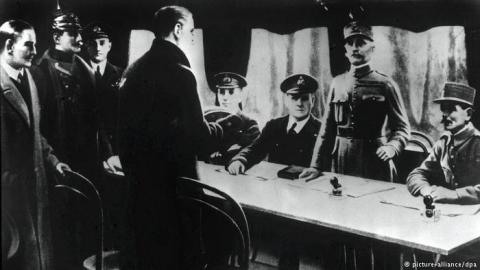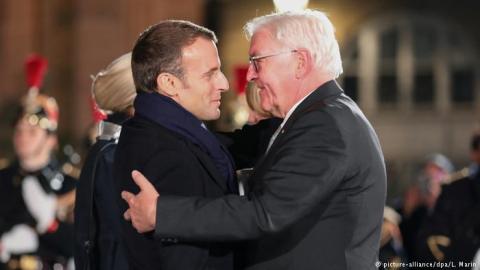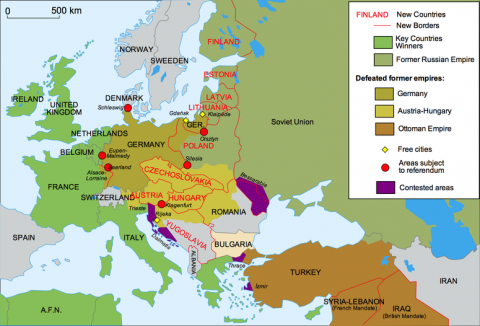Image may be NSFW.
Clik here to view.
Artist's depiction of the World War I armistice signing in the rail car at Compiegne: Germany's Matthias Erzberger (center, standing) and France's Marshal Ferdinand Foch (at right, standing) negotiate what is now called in fake history the German capitulation.
By Carolyn Yeager
ON THE 11TH DAY OF THE 11TH MONTH OF NOVEMBER 1918, a German government delegation led by Mathias Erzberger crossed into France and signed a cease-fire at the 11th hour in the presence of Marshall Ferdinand Foch and other French and British military commanders. Yet this is now called by official historians a German surrender.
Update: See some great pics and news items in real time here: https://twitter.com/RealTimeWW1
Germany never intended to surrender militarily, but between this date and 28 June, 1919 when a peace treaty was signed in the Hall of Mirrors at the Versailles palace outside Paris, the United States, Britain, France and Italy colluded in separating Germany from her allies, bullying and blockading (starving) her into accepting unacceptable conditions of peace. They did the same with Austria and Hungary, in separate treaties.
The great “European war” was originally instigated by the irresponsible trade and economic ambitions of the British foreign office (see here), but it got out of control and became a titanic struggle that conservatively took the lives of 8.5 million military personnel, and around 13 million civilians. [An estimated nine million combatants and seven million civilians died as a direct result of the war, while it is also considered a contributory factor in a number of genocides and the 1918 influenza epidemic, which caused between 50 and 100 million deaths worldwide. (Rachel Williams, 2014. Dual Threat: The Spanish Influenza and World War I. University of Tennessee Thesis)].
Because the carnage was so terrible and also for no good purpose, the Allied Powers (British Empire, France, Russia, Italy, and the U.S. after 1917) agreed to fix the blame for starting the war on the Central Powers (Austria-Hungary, Germany, Turkish Ottoman Empire and Bulgaria). While it is not very much emphasized today (WWII has taken its place in that regard), that blame is still officially recognized in the history of this war, the conclusion of which the victors are commemorating on Sunday.
Assigning war guilt
One provision in the Versailles treaty required Germany "[to] accept the responsibility of Germany and her allies for causing all the loss and damage" during the war. Article 231later became known as the War Guilt clause. The other members of the Central Powers were forced to sign separate treaties (Saint-Germaine and Trianon) containing similar articles.
Georges Clemenceau, French Prime Minister, rebuffed the protestations of German delegation head, Count Ulrich von Brockdorff-Rantzau with regard to German liability, arguing that it was a legal necessity, not a political question. (On May 5, Brockdorff-Rantzau had been informed that the Germans would have no negotiating powers at Versailles. They could only accept or reject the conditions offered within a 15 day window!) Lloyd George of Britain commented that "the English public, like the French public, thinks the Germans must above all acknowledge their obligation to compensate us for all the consequences of their aggression. When this is done we come to the question of Germany's capacity to pay; we all think she will be unable to pay more than this document requires of her." [MacMillan, Margaret; Holbrooke, Richard (2003). Paris 1919: Six Months that Changed the World. New York: Random House.]
The German Chancellor Schiedemann resigned his office rather than sign the treaty. But Field Marshal Hindenburg advised his government that Germany was in no condition to resume the war, and because the population was suffering greatly, Germany unconditionally signed the peace treaty on 22 June 1919, hoping for merciful treatment.
How Europe's leaders are commemorating the Centennial
Image may be NSFW.
Clik here to view.
Commemorative events in Europe began on Sunday, Nov. 4 with a concert in Strasbourg's cathedral attended by German President Frank-Walter Steinmeier and French President Emmanuel Macron (seen embracing above). Macron has since traveled across northern and eastern France to visit former battlefields. On Friday, Macron and British PM Theresa May will lay wreaths in the town of Albert to honor British soldiers who died at the Battle of the Somme. On Saturday, Macron will meet German Chancellor Angela Merkel in the village of Rethondes for a ceremony at the train carriage where the armistice was regrettably signed by the Germans in 1918.
The culminating event will be the ceremony at the Arc de Triomphe in Paris on Sunday, November 11, where some 60 heads of state and government, including Donald Trump and Vladimir Putin, are expected to attend. World leaders will then attend a 3-day 'peace forum' arranged by Macron and to be opened by Merkel.
Notably, no armistice ceremonies have been planned in Germany, or in Austria or Hungary. Instead of peace, the armistice and following treaties brought only years of punitive demands, economic hardship, widespread poverty and hunger to Germans, Austrians and Hungarians.
Two of my podcasts and a short article on WWI can be found here, here and here.
Macron attacks Nationalism, Hitler
As he toured centennial sites this week, Macron warned about the “risng threat of far-right nationalism” currently, telling a regional newspaper that “complacency was what allowed for the rise of Hitler and Mussolini.”
"I would suggest that you reread what was said at the time," the 40-year-old president said.
"Well-educated, well-informed people said that we could get along with the nationalists. As I recall, nobody, not even the wealthiest and the best educated, blocked the rise of Hitler in one country and Mussolini in another.
Yet he upset the Jewish community by announcing that Marshal Philippe Petain would be honored alongside seven other generals at the Saturday ceremony with Merkel. Petain was a national hero in WWI for defeating the Germans at Verdun in 1917, but later was imprisoned as a traitor after France was so soundly defeated by the Wehrmacht in 1940 that the honorable Petain, as Chief of State, had to agree to an armistice and the occupation of Vichy France by Adolf Hitler's regime. As usual, Jews only really care about what affects them.
Macron also pointed to the success of the National Front in France and Matteo Salvini's League party in Italy as a threat to peace:
"I want to draw everyone's attention to this point. Is it the case that nationalist sentiments are rising? Yes. Are the people who are pushing for a return to conflict not those who are gaining ground in a number of European countries? Yes."
"We must look these (nationalisms and extremes) in the face and tackle the root causes of the inequalities that exist. That's what I'm trying to do."
This will probably be addressed at the world 'peace forum' scheduled for next week.
Woodrow Wilson's Vision of Peace
U.S. President Wilson came into the war in 1917 with high-sounding words about bringing lasting peace and democracy to the world, i.e. "The war to end all wars" and "Making the world safe for democracy." At the wintersonnenwende.com website, you can read a selection, in German and English, of his incredibly biased speeches to Americans, meant to convince them to join the fight in Europe, and note his increasingly hostile attitude toward Germans once the US was in the fight.
It must be pointed out that Wilson's 14 Points were used to give self-determination to the various Slav groups that had been a part of the Austro-Hungarian empire. This empire was already breaking up in 1918 and becoming the separate Republic of Austria and Kingdom of Hungary. But after the Poles', Czechs', Slovaks', Romanians' and other south Slav independent territorial demands were met, Austria had lost 60% of its former land mass and Hungary was 72% smaller! Both became land-locked nations where previously they had access to the sea and even had a substantial navy. These two nations were screwed by the “peace process” even worse than was Germany. Their economies were destroyed by eliminating their self-sufficiency in many essential commodities, which they did not have the money to purchase. See here.
Image may be NSFW.
Clik here to view.
Notice there was no Poland in 1914; Poles lived mainly in Russia and Prussia. The Czechs, Slovaks and South Slavs were in Austria-Hungary primarily. All the new countries that were carved out for them after the war, seen in the bottom map, failed. (click to enlarge)
Image may be NSFW.
Clik here to view.
President Wilson, however, ignorant of European realities, must have been impressed by his own sense of moral right and his lofty phrases. For instance:
Address to Congress, Jan. 1918 -
The program of the world's peace, therefore, is our program; and that program, the only possible program, as we see it, is this ...
Point VIII. All French territory should be freed and the invaded portions restored, and the wrong done to France by Prussia in 1871 in the matter of Alsace-Lorraine, which has unsettled the peace of the world for nearly fifty years, should be righted, in order that peace may once more be made in the interest of all. [Germany's interest of course doesn't count.]
Point X.The peoples of Austria-Hungary, whose place among the nations we wish to see safeguarded and assured, should be accorded the freest opportunity of autonomous development. [Reneged on this, as the Austrians who were ethnically German were prevented from joining with Germany as they wished to do by a vast majority. They also could not “develop” as so much of their resources were given to the new states.]
Point XIII. An independent Polish state should be erected which should include the territories inhabited by indisputably Polish populations, which should be assured a free and secure access to the sea, and whose political and economic independence and territorial integrity should be guaranteed by international covenant. [By cutting German West Prussia off from East Prussia to provide a Polish-owned corridor to the Danzig port, this only set the stage for conflict with Germany, not peace.]
Point XIV. A general association of nations must be formed [League of Nations] under specific covenants for the purpose of affording mutual guarantees of political independence and territorial integrity to great and small states alike.
We have no jealousy of German greatness, and there is nothing in this program that impairs it. We grudge her no achievement or distinction of learning or of pacific enterprise such as have made her record very bright and very enviable. We do not wish to injure her or to block in any way her legitimate influence or power. We do not wish to fight her either with arms or with hostile arrangements of trade if she is willing to associate herself with us and the other peace-loving nations of the world in covenants of justice and law and fair dealing. We wish her only to accept a place of equality among the peoples of the world, the new world in which we now live, instead of a place of mastery. [Mastery is reserved for the inner circles of London and New York, where Jewry rules. That's how I see it.]
Speech in New York, September 27, 1918.
We are all agreed that there can be no peace obtained by any kind of bargain or compromise with the Governments of the Central Empires, because we have dealt with them already and have seen them deal with other Governments that were parties to this struggle, at Brest-Litovsk and Bucharest. They have convinced us that they are without honor and do not intend justice. They observe no covenants, accept no principle but force and their own interest. We cannot "come to terms" with them. They have made it impossible. The German people must by this time be fully aware that we cannot accept the word of those who forced this war upon us. We do not think the same thoughts or speak the same language of agreement.
The reason we can't get it right today is because we're still getting it wrong about then. When will you put historical exactitude first, Europe?